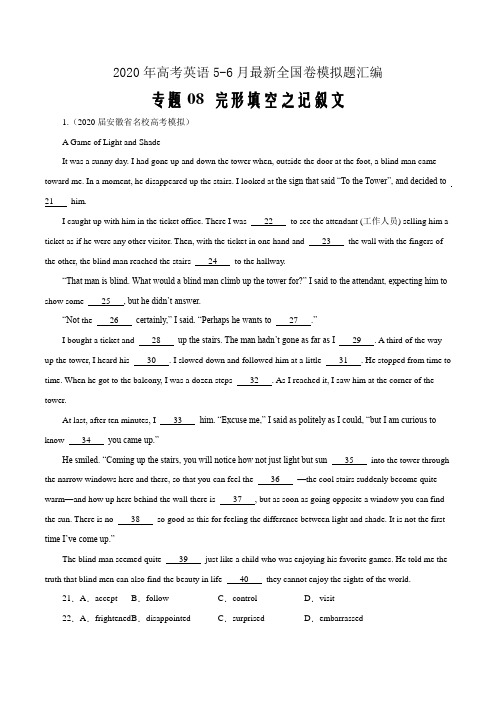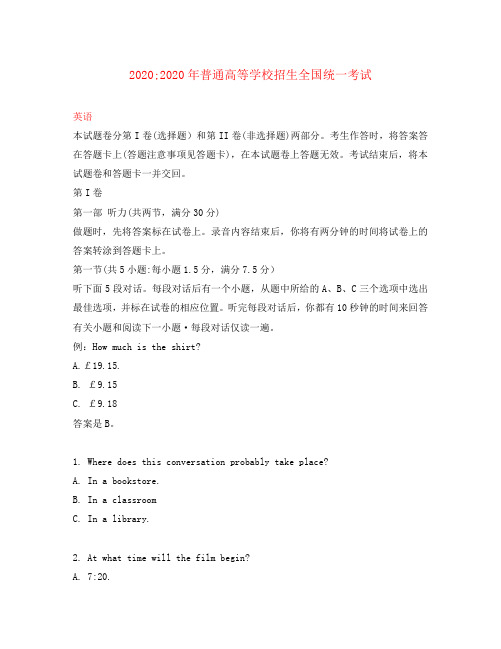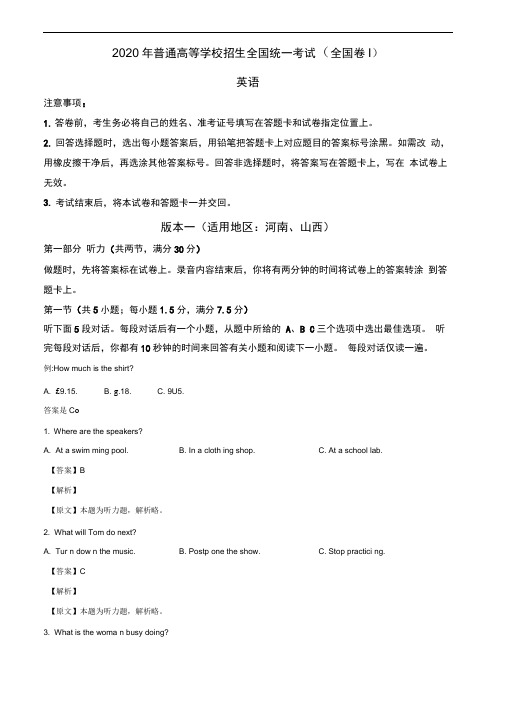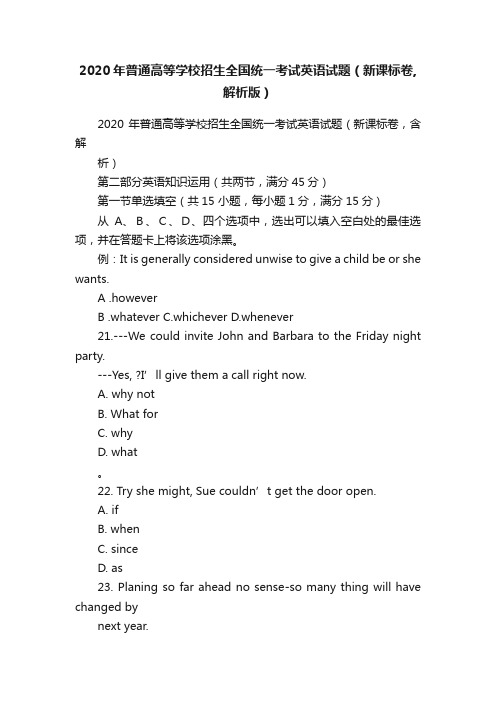2020高三英语月考卷六新课标全国卷题型
全国大联考 2020 届高三 6 月大联考英语试卷-含答案

秘密★考试结束前全国大联考 2020 届高三 6 月大联考英语试卷注意事项:1.答卷前,考生务必将自己的姓名、准考证号填写在答题卡和试卷指定位置上。
2.回答选择题时,选出每题答案后,用 2B 铅笔把答题卡上对应题目的答案标号涂黑。
如需改动,用橡皮擦干净后,再选涂其他答案标号。
回答非选择题时,将答案写在答题卡上,写在本试卷上无效。
3.考试结束后,将本试卷和答题卡一并交回。
4.考试时间 120 分钟,满分 150 分。
第一部分 听力(共两节,满分 30 分)做题时,请先将答案标在试卷上,录音内容结束后,你将有 2 分钟的时间将试卷上的答案转涂到客观题答题卡上。
第一节(共 5 小题;每小题 1.5 分,满分 7.5 分)听下面 5 段对话。
每段对话后有一个小题,从题中所给的 A、B、C 三个选项中选出最佳选项。
听完每段对话后,你都有 10 秒钟的时间来回答有关小题和阅读下一小题。
每段对话仅读一遍。
例:How much the shirt?A. £19.15.B.£9.18.C.£9.15.答案是 C1. What fruit does the woman use?A. Pears. B. Oranges. C. Bananas.2. What did the woman do today?A. She cleaned the car.B. She bought an umbrella.C. She listened to the weather forecast.3. When does the man usually do exercise?A. In the afternoon. B. In the morning. C. At night.4. What is the probable relationship between the speakers?A. Father and daughter. B. Classmates. C. Teacher and student.5. What are the speakers mainly talking about?A. Preparing for a test. B. Eating during an exam. C. Getting a medical exam.第二节(共 15 小题;每小题 1.5 分,满分 22.5 分)听下面 5 段对话或独白。
2020年高考英语5-6月最新全国卷模拟题汇编8 完形填空之记叙文 (解析word版)

2020年高考英语5-6月最新全国卷模拟题汇编专题08 完形填空之记叙文1.(2020届安徽省名校高考模拟)A Game of Light and ShadeIt was a sunny day. I had gone up and down the tower when, outside the door at the foot, a blind man came toward me. In a moment, he disappeared up the stairs. I looked at the sign that said “To the Tower”, and decided to21 him.I caught up with him in the ticket office. There I was 22 to see the attendant (工作人员) selling him a ticket as if he were any other visitor. Then, with the ticket in one hand and 23 the wall with the fingers of the other, the blind man reached the stairs 24 to the hallway.“That man is blind. What would a blind man climb up the tower for?” I said to the attendant, expecting him to show some 25 , but he didn’t answer.“Not the 26 certainly,” I said. “Perhaps he wants to 27 .”I bought a ticket and 28 up the stairs. The man hadn’t gone as far as I 29 . A third of the way up the tower, I heard his 30 . I slowed down and followed him at a little 31 . He stopped from time to time. When he got to the balcony, I was a dozen steps 32 . As I reached it, I saw him at the corner of the tower.At last, after ten minutes, I 33 him. “Excuse me,” I said as politely as I could, “but I am curious to know 34 you came up.”He smiled. “Coming up the stairs, you will notice how not just light but sun 35 into the tower through the narrow windows here and there, so that you can feel the 36 —the cool stairs suddenly become quite warm—and how up here behind the wall there is 37 , but as soon as going opposite a window you can find the sun. There is no 38 so good as this for feeling the difference between light and shade. It is not the first time I’ve come up.”The blind man seemed quite 39 just like a child who was enjoying his favorite games. He told me the truth that blind men can also find the beauty in life 40 they cannot enjoy the sights of the world.21.A.accept B.follow C.control D.visit22.A.frightened B.disappointed C.surprised D.embarrassed23.A.touching B.climbing C.hitting D.covering 24.A.pointing B.attaching C.contributing D.leading 25.A.respect B.doubt C.concern D.sympathy 26.A.view B.test C.prize D.trick27.A.kick B.jump C.relax D.escape 28.A.struggled B.explored C.wandered D.hurried 29.A.promised B.examined C.imagined D.confirmed 30.A.steps B.words C.secrets D.cheers 31.A.standard B.distance C.expense D.intention 32.A.ahead B.around C.outside D.behind 33.A.recognized B.surrounded C.approached D.witnessed 34.A.why B.how C.when D.whether 35.A.knocks B.pours C.slides D.bursts36.A.trend B.reaction C.change D.honor37.A.light B.space C.mess D.shade38.A.place B.signal C.object D.period 39.A.nervous B.content C.curious D.patient 40.A.unless B.because C.once D.although【答案】21.B22.C23.A24.D25.C26.A27.B28.D29.C30.A31.B32.D33.C34.A35.B36.C37.D38.A39.B40.D【解析】本文是一篇记叙文,作者跟随着一位盲人登塔,盲人告诉他尽管盲人们无法享受世界上的风景,但他们也能找到生活里的美。
全国大联考2020届高三第六次联考 英语试题(PDF版)

+%X;>B>8542%
,%X;BB3>18H4%
h!)j!!'!"&
!'%./015/3;<2L0>A/0728774Q1L3720A
-%.3>>842%
+%+5;660>A%
,%+5/3>173H4<%
-%+C8<6>4H84:%
!!%O3: 607A:3>252345L0>A744213:>814C3>1/40558D76471
+%E>36070>18G<4%
,%E>360C>8472%
-%E>360=[B>3D>06%
!K%O3:3C14723B43B<4?<879:/8<4510>87D011/4G36B;14>5G>447
+%*186450687;14%
,%""186450687;14%
!&%./0123451/4:36071/8791/46075/3;<223
G80<<AC3>H0>8418453C3;1233>0G18H818450H08<0?<4/4>4%,054A3;>54<C011/4@<0G84>U0>9 ]32D4&:/4>4A3;G071/475413;1370/8943>0?30187D1>8B%J?54>H4?8>2507231/4> 1AB453C:8<2<8C4&87G<;287D?<0G9?40>507263;71087D3015%
2020届高三6月联考英语试题(含答案)

高三6月联考英语试题本试题卷共4页,分第I卷和第Ⅱ卷两部分。
全卷满分150分。
考试用时120分钟。
第Ⅰ卷第一部分:听力(共两节,满分30分)第一节(共5小题;每小题1.5分,满分7.5分)听下面5段对话。
每段对话后有一个小题,从题中所给的A、B、C三个选项中选出最佳选项,并标在试卷的相应位置,听完每段对话后,你都有10秒钟的时间来回答有关小题和阅读下一小题,每段对话仅读一遍。
例:How much is the shirt?A. £19.15.B. £9.18.C. £9.15.答案是C。
1. What are they going to do?A. Fishing.B. Swimming.C. Climbing.2. Where does the conversation probably take place?A. In a classroom.B. In a dining-room.C. In a post office.3. What is the relationship between the two speakers?A. Teacher and student.B. Boss and employee.C. Waiter and customer.4. What did the man do in the winter vacation?A. Get together with friends.B. Go somewhere to travel.C. Stay at home.5. At what time will the taxi arrive?A. 4:30 p.m.B. 4:00 p.m.C. 3:30 p.m.第二节(共15小题;每小题1.5分,满分22.5分)听下面5段对话或独白。
每段对话或独白后有几个小题。
从题中所给的A、B、C三个选项中选出最佳选项,并标在试卷的相应位置。
2020年普通高等学校招生全国统一考试英语试题(新课标卷,含答案)(1)

2020;2020年普通高等学校招生全国统一考试英语本试题卷分第I卷(选择题)和第II卷(非选择题)两部分。
考生作答时,将答案答在答题卡上(答题注意事项见答题卡),在本试题卷上答题无效。
考试结束后,将本试题卷和答题卡一并交回。
第I卷第一部听力(共两节,满分30分)做题时,先将答案标在试卷上。
录音内容结束后,你将有两分钟的时间将试卷上的答案转涂到答题卡上。
第一节(共5小题:每小题1.5分,满分7.5分)听下面5段对话。
每段对话后有一个小题,从题中所给的A、B、C三个选项中选出最佳选项,并标在试卷的相应位置。
听完每段对话后,你都有10秒钟的时间来回答有关小题和阅读下一小题·每段对话仅读一遍。
例:How much is the shirt?A.£19.15.B. £9.15C. £9.18答案是B。
1. Where does this conversation probably take place?A. In a bookstore.B. In a classroomC. In a library.2. At what time will the film begin?A. 7:20.C. 7:00.3. What are the two speakers mainly talking about?A.Their friend Jane.B. A weekend trip.C. A radio programme.4. What will the woman probably do?A. Catch a train.B. See the man off.C. Go shopping.i5. Why did the woman apologize?A. She made a late delivery.B. bne went to the wrong place.C. She couldn't take the cake back.第二节(共15小题:每小题1.5分,满分22.5分)听下面5段对话。
全国大联考2020届高三第六次大联考英语试题-含答案

,%.3>93;1%
-%O0H40B8G78G%
h!*j!)T&
)%./01011>0G151/460763510?3;1D387D13-06?>82D4V78H4>581A
+%,>8185/G;<1;>4%
,%=/4G3<<4D4W5>4B;101837%
-%=/4G3<<4D4W50G/84H46471% T%./0123451/4:3607C44<0?3;11/4607W5B<07871/4472
"%./01851/4B>3?0?<4>4<018375/8B?41:4471/45B4094>5
+%E01/4>07220;D/14>%,%-<05560145%-%-3F:3>94>5%
(%./4>423451/4G37H4>5018371094B<0G4
+%I71/4981G/47%
!*%./A282R370<2?;AL0Q(
-%V5453644A4F2>3B5%
+%E3>50C41A%
,%E3>G36B07A%
!)%./01282L0Q23131/4>3??4>(
-%E3>B<405;>4%
+%O4?811/4>3??4>W5<4D%
,%O4?0>942<3;2011/4>3??4>%
,%R;<<%
-%S;5153F53%
!!"#!""
2020年全国统一高考英语试卷(新课标Ⅰ)(解析版)

2020年普通高等学校招生全国统一考试(全国卷I)英语注意事项:1.答卷前,考生务必将自己的姓名、准考证号填写在答题卡和试卷指定位置上。
2.回答选择题时,选出每小题答案后,用铅笔把答题卡上对应题目的答案标号涂黑。
如需改动,用橡皮擦干净后,再选涂其他答案标号。
回答非选择题时,将答案写在答题卡上,写在本试卷上无效。
3.考试结束后,将本试卷和答题卡一并交回。
版本一(适用地区:河南、山西)第一部分听力(共两节,满分30分)做题时,先将答案标在试卷上。
录音内容结束后,你将有两分钟的时间将试卷上的答案转涂到答题卡上。
第一节(共5小题;每小题1.5分,满分7.5分)听下面5段对话。
每段对话后有一个小题,从题中所给的A、B C三个选项中选出最佳选项。
听完每段对话后,你都有10秒钟的时间来回答有关小题和阅读下一小题。
每段对话仅读一遍。
例:How much is the shirt?A. £9.15.B. g.18.C. 9U5.答案是C o1. Where are the speakers?A. At a swim ming pool.B. In a cloth ing shop.C. At a school lab.【答案】B【解析】【原文】本题为听力题,解析略。
2. What will Tom do next?A. Tur n dow n the music.B. Postp one the show.C. Stop practici ng.【答案】C【解析】【原文】本题为听力题,解析略。
3. What is the woma n busy doing?A. Working on a paper.B. Tidying up the office.C. Organizing a party.【答案】C【解析】【原文】本题为听力题,解析略。
4. When will Henry start his vacation?A. This weekend.B. Next week.C. At the end of August.【答案】A【解析】【原文】本题为听力题,解析略。
2020年普通高等学校招生全国统一考试英语试题(新课标卷,解析版)

2020年普通高等学校招生全国统一考试英语试题(新课标卷,解析版)2020年普通高等学校招生全国统一考试英语试题(新课标卷,含解析)第二部分英语知识运用(共两节,满分45分)第一节单选填空(共15 小题,每小题1分,满分15分)从A、B、C、D、四个选项中,选出可以填入空白处的最佳选项,并在答题卡上将该选项涂黑。
例:It is generally considered unwise to give a child be or she wants.A .howeverB .whatever C.whichever D.whenever21.---We could invite John and Barbara to the Friday night party.---Yes, ?I’ll give them a call right now.A. why notB. What forC. whyD. what。
22. Try she might, Sue couldn’t get the door open.A. ifB. whenC. sinceD. as23. Planing so far ahead no sense-so many thing will have changed bynext year.A.madeB.is makingC.makesD.has made24.I wasn’t sure if he was really interested or if he polite.A.was just beingB.will just beC.had just beenD.would just be25.-Someone wants you on the phone.- nobody knows I am here.A.AlthoughB.AndC.ButD.So26.I can the house being untidy, but I hate it if it’s not clean.A. come up withB.put up withC. turn toD.stick to27.The next thing he saw was smoke from behind the house.A.roseB.risingC. to riseD.risen28.Only when he reached the tea-house it was the same place he’d been in last year.A. he realizedB.he did realizeC.realized heD.did he realize29.When Alice came to, she did not know how long she there.A.had been lyingB.has been lyingC.was lyingD.has lain30.The form cannot be signed by anyone yourself.A.rather thanB.other thanC.more thanD.better than31.The prize will go to the writer story shows the most imagination.A.thatB.whichC.whoseD.what32.They have arrived at lunchtime but their flight was delayed.A.willB.canC.mustD.should33.It is generally accepted that boy must learn to stand up and fight like man.A.a;aB.a;theC.the;theD.a;不填34.William found it increasingly difficult to read, for his eyesight was beginning to .A.disappearB.fallC.failD.damage35.—Artistic people can be very difficult sometimes.—Well, you married one. .A.You name itB.I’ve got itC.I can’t agree mor eD.You should know第二节完形填空(共20小题:每小题1.5分,满分30分)阅读下面的短文,从短文后各题所给的四个选项(A、B、C和D)中,选出可以填入空白处的最佳选项,并在答题卡上将该项涂黑。
- 1、下载文档前请自行甄别文档内容的完整性,平台不提供额外的编辑、内容补充、找答案等附加服务。
- 2、"仅部分预览"的文档,不可在线预览部分如存在完整性等问题,可反馈申请退款(可完整预览的文档不适用该条件!)。
- 3、如文档侵犯您的权益,请联系客服反馈,我们会尽快为您处理(人工客服工作时间:9:00-18:30)。
2016高三英语月考卷六第Ⅰ卷(100分)第一部分听力(略)第二部分阅读理解(共两节,满分40分)第一节(共15小题;每小题2分,满分30分)阅读下列短文,从每题所给的四个选项(A、B、C、和D)中,选出最佳选项,并在答题卡上将该项涂黑。
AHave you ever heard the saying “All roads lead to Rome”? At one time, this was pretty much true. During the Roman Empire, lots of roads were built in order to move armies, send messages by courier (信使), and make trade easier.The network of Roman roads was begun in 312 BC. It was demanded that the roads be built strong so that they would not fall down. Roman soldiers, supervised (监督) by engineers, laid down the roads in a special pattern of layers. There were all together 4 layers, which was made of different materials, such as sand, rocks, stones and so on.Also, Roman roads were cambered (拱形). This means that they were built higher in the middle than on the edges, allowing rainwater to run off, which prevented flooding. We use the same technique in building roads today. The Romans also laid out roads over hills when necessary, setting them down in a zigzag (之字形的)pattern to make the road rise gradually.All Roman roads had milestones (里程碑), placed every thousand paces (a Roman mile). The milestones told when the road was built, who was emperor at the time, the road’s destination, how far the traveler was from the destination, and how many miles had been traveled since the beginning of the road. This information was a great help to travelers.Because of their excellence in construction, it really is no surprise that many parts of Roman road still exist today. These roadways are one of the most impressive achievements of the Roman Empire.21. The following description about Roman roads is true EXCEPT _____.A. Roman roads were built by the Roman soldiers directed by the engineersB. Roman roads could prevent flooding using the techniqu e we don’t use todayC. Roman roads had milestones that were placed every Roman mileD. Roman roads still exist today as an impressive achievement of Roman Empire22. What information can you find on the milestones?A. The builders of the road.B. The materials used in building roads.C. The distance from one city.D. The time spent in building roads.23. The passage mainly ________.A. explains the saying “All roads lead to Rome”B. praises ancient Romans for their great achievementsC. shows how great the Roman Empire wasD. introduces the construction of the Roman roadsBAfter having worked in the University of Maryland for three years, I got a job offer from another university--Lynn University. I left my letter of offer on my present boss’s desk, turned around, and closed the door quietly. I was expecting a call from my boss saying congratulations, which would show her approval of my leaving.In the afternoon, my boss called me, saying, “Can we meet tomorrow?” That was a good signal. The next day, I met with my boss. She said, “Nicholas, we want you. What do you want?” I said, “Boss, I deserve a significant pay raise this year due to my outstanding performance. I think I need a 10% pay raise next year as a condition for me to stay here.” My boss said, “No problem.'”When I left her office, I called Lynn University and told them that I was going to get a 10% pay raise. They had to give me 10% more than their original pay offer in order for me to accept the job. The new boss told me that he was willing to give me more, but I would feel very bad working at this university with such a high pay. I would win a battle, but I would lose a war. He said, "The problem is that your colleague will earn less than you, so you will feel guilty and uncomfortable. But, I can still give you 5% more than the original offer."I delivered this massage to my present boss, and she told me that she would give me another5% pay raise if I promised to refuse this new job offer. On top of that, she would strongly support my early promotion from assistant professor to associate professor. According to the university policy, you must take at least 6 years to get promoted. That was my third year of employment at this university. After refusing the new job offer, I finally enjoyed both a pay raise and early promotion.24. In paragraph 2, what does Nicholas mean by “That was a good signal”?A. His boss would approve his leaving the University of Maryland.B. He would leave his present job and work for Lynn University.C. His boss would talk with him about a possible pay offer.D. His friends would congratulate him on getting a new job offer.25. Why did the new boss agree to another 5% raise when Nicholas asked for 10% the next day?A .He did not have the right to make such a big pay offer.B. he did not want Nicholas to earn more than he did.C. Nicholas was not experienced enough to get such a raise.D. Nicholas would not feel good for earning too much more than others.26. How much pay raise did the author finally get as a result of refusing the new job offer?A. 5%B. 10%C. 15%D. 20%27. In the text, the author mainly tells his experience of _______.A. earning a pay raiseB. refusing a job offerC. applying for a new positionD. making decisions in the workplaceCHortonAt first glance, there is little in Horton to attract people. The other nearby towns have much more to offer: Bradfield has its river and historic buildings, while Newtown has shops and entertainment. The buildings of Horton look dirty and unloved. For shops, there is a small supermarket, a few bargain shops, a bakery which, strangely, does not sell bread and a florist which has one stand of sad-looking flowers. Even so, Horton has several advantages over its neighbouring towns.Firstly, it has a country park. Four thousand years ago, this was an important fort. There are no historic remains here now, but there are wonderful views over the countryside. On sunny weekends you can often see kids out with their parents, kicking balls or flying kites.Ther e aren’t many job opportunities in Horton, and the roads to nearby cities aren’t really fast, but there are excellent rail links. You can be in London in an hour and a half, and other cities are less than an hour away. That means that parents can earn a good salary and still get home in time to spend the evenings with their families. Houses in Horton aren’t pretty, but they’re functional and cheap. The streets are quiet and safe, and there are plenty of parks and playgrounds. It has a library, three primary schools and a secondary school, St. Mark’s. It is friendly and offers a wide range of subjects and activities to children of all abilities and backgrounds. The town also has a swimming and a sports center, and the community halls hold regular clubs and events for people of all ages.28. What is the writer’s main purpose?A. To explain what tourists can do in Horton.B. To explain why Horton is a good place to live in.C. To explain why Horton is not as pleasant as other towns.D. To describe the history of Horton.29. Which part of Horton does the writer find disappointing?A. the shopsB. country parkC. transport linksD. the schools30. Which of the following is NOT the advantage of Horton?A. plenty of parks and playgroundsB. historical buildingsC. the quiet and safe streetsD. functional and cheap houses31. What advantages does Horton bring to workers?A. There are plenty of jobs available in the town.B. You can drive to nearby cities in a short time.C. You can get to several cities quickly by train.D. Working conditions are better here than in other towns.DAccording to researchers, money can buy happiness, but only if you spend it on someoneelse.Spending as little as $5 a day on someone else could significantly bring you happiness, the team at the University of British Columbia and Harvard Business School found.Their experiments on more than 630 Americans showed they were measurably (适度地) happier when they spent money on others--even if they thought spending the money on themselves would make them happier.“We wanted to test our theory that how people spend their money is at least as important as how much money they earn,” said Elizabeth Dunn, a psychologist at the University of British Columbia.They asked their 600 volunteers first to rate their general happiness, report their annual income and detail their monthly spending including bills, gifts for themselves, gifts for others and donations to charity.“Regardless of how much income each person made, t hose who spent money on others reported greater happiness, while those who spent more on themselves did not,” Dunn said in a statement.Dunn’s team also surveyed 16 employees at a company in Boston before and after they received an annual profit-sharing bonus of between $3,000 and $8,000.“Employees who devoted more of their bonus to pro-social (有益社会的) spending experienced greater happiness after receiving the bonus, and the manner in which they spent that bonus was a more important predictor of their happi ness than the size of the bonus itself,” they wrote in their report, published in the journal Science.They gave their volunteers $5 or $20 and half got clear instructions on how to spend it. Those who spent the money on someone or something else reported feeling happier about it.“These findings suggest that very minor alterations in spending allocations (分配) --as little as $5--may be enough to produce real gains in happiness on a given day,” Dunn said.32. According to the passage, ________.A. the more money you spend on others, the happier you areB. spending money on others can bring you happinessC. Elizabeth Dunn is a psychologist from Harvest Business SchoolD. six hundred volunteers took part in the experiment33. The 16 employees mentioned in the passage _________.A. were given clear instructions on how to spend the bonusB. had more happiness than the size of the bonus itselfC. experienced greater happiness after receiving their bonusD. felt happier after they contributed much of the bonus to charities34. Dunn’s statement suggested that ________.A. those who spent money on others felt happier no matter how much they earnedB. those who spent more money on themselves felt happierC. people thought spending money could make themselves happierD. the money spent was as important as the money earned35. The best title of this passage is ________.A. Experiment on Money SpendingB. Devoting Your Money to CharitiesC. Spending Money on Others Makes One HappierD. Bonus and Pro-social Spending第二节(共5小题:每小题2分,满分10分)根据短文内容,从短文后的选项中选出能填入空白处的最佳选项。
